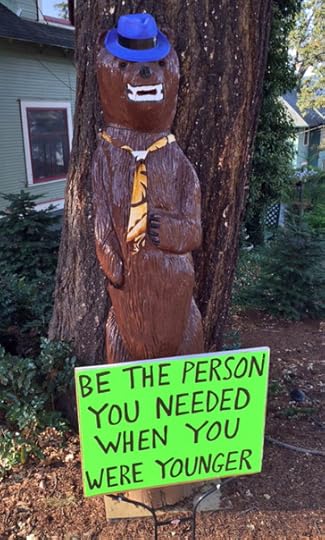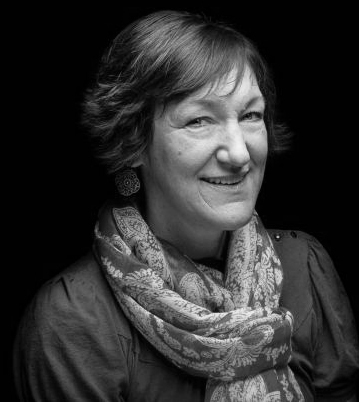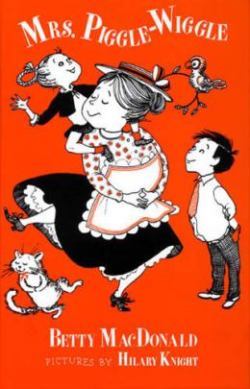Drew Myron's Blog, page 41
October 28, 2015
Thankful Thursday: Things that cannot last

Overnight everything changes and I wake to a cold morning, gray sky, and thick woodsy air.
Of course the seasonal shift is not overnight. It lurked and creeped, and all of the sudden I'm wearing sweaters and making soup. As if summer were endless, I'm always surprised.
And as usual, a poem arrives: “I want to praise things that cannot last," writes Barbara Crooker, who offers many excellent poetic praises.
Equinox
Another October. The maples have done their slick trick
of turning yellow almost overnight; summer’s hazy skies
are cobalt blue. My friend has come in from the West,
where it’s been a year of no mercy: chemotherapy, bone
marrow transplant, more chemotherapy, and her hair
came out in fistfuls, twice. Bald as a pumpkin.
And then, the surgeon’s knife.
But she’s come through it all, annealed by fire,
calm settled in her bones like the morning mist in valleys
and low places, and her hair’s returned, glossy
as a horse chestnut kept in a shirt pocket.
Today a red fox ran down through the corn stubble;
he vanished like smoke. I want to praise things
that cannot last. The scarlet and orange leaves
are already gone, blown down by a cold rain,
crushed and trampled. They rise again in leaf meal
and wood smoke. The Great Blue Heron’s returned to the pond,
settles in the reeds like a steady flame.
Geese cut a wedge out of the sky, drag the gray days
behind them like a skein of old wool.
I want to praise everything brief and finite.
Overhead, the Pleiades fall into place; Orion rises.
Great Horned Owls muffle the night with their calls;
night falls swiftly, tucking us in her black velvet robe,
the stitches showing through, all those little lights,
our little lives, rising and falling.
— Barbara Crooker, from Selected Poems
It's Thankful Thursday, a weekly pause to express appreciation for people, places, poems and more. What are you thankful for today?
October 22, 2015
Thankful Thursday: Readers
[image error]
The world is full of people writing poems.
The world is less full of people reading poems.
Poets read poems, but mostly their own.
Thankfully, I've found a fervent audience of people who read poems but don't write them.
[ Caveat: Maybe a few are dipping their toes in the pool. But for the purposes of my purpose let's just say they are, for now, closeted poets, which is really a wonderful kind of poet. So full of wonder and willingness in their hidden identity. ]
I found this audience of readers in a weekly email quietly distributed by Vicki Hellmer, a rare bird of a woman who studies and appreciates poetry but doesn't actually write poems. She's not a professor, librarian, bookstore owner, or any of those careers you associate with "day job." She's a lawyer, and she's honoring poetry one person and poem at a time.
Here's how: Every Wednesday she sends an email containing a poem, supplemented with well-researched background to deepen the reading experience.
The service is free, and unintrusive. It's not slick and corporate. It's safe and nurturing, a neighborly nudge that says, "I found this. You may like it too."
And usually I do. Vicki is a voracious reader and has good, wide taste.
Which brings me back to me (again? already?). For a few weeks, I'm serving as "Poetry Group Poobah" (that's what one of the readers called me; I think kindly). Vicki invited me to choose poems, write some background, and share with the group.
And guess what?! I've found enthusiastic readers, and many have replied with thoughtful notes about the featured poems. (Poems shared so far: Kindness by Naomi Shihab Nye, and A Secret Life by Stephen Dunn). Turns out the world is peppered with poetry appreciators.
Want to get a fresh & friendly poem each week? Jot an email to Vicki Hellmer, Poetry Hostess: vhellmer@ottenjohnson.com
Thank you, Vicki, for quietly and earnestly sharing your appreciation of poetry. And thank you, poetry readers, for keeping poems alive and loved.
It's Thankful Thursday, a weekly pause to express appreciation for people, places, poems & more. What are you thankful for today?
October 19, 2015
Survival Story
[image error]After my daughter died, I often could not get up off of the floor. I stumbled through my days half in the grave, planning ways to get all the way there," says Amber Keyser, a biologist-turned-writer, who gravitates to stories about heroes, scientists, and adventurers.
Her recently published novel, The Way Back from Broken, is a tale of survival — physical, emotional, mental — that is earning critical praise.
At 3 Good Books (a blog series I host) Amber Keyser shares three good works that got her through.
October 15, 2015
Thankful Thursday: Signs (again)

Because attention attracts gratitude and gratitude expands joy, it's time again for Thankful Thursday, a weekly pause to express appreciation for people, places, things and more.
I like a good sign. Skip the platitudes and syrupy affirmations. Stir my mind, slow my fret. I want to feel, to sigh with a hmmmm. It's so much to ask, I know.
On this Thankful Thursday, I appreciate this odd, silly, profound Bearer of Truth.
What are you thankful for today?
See more messages, signs & reminders:
October 10, 2015
Fast Five with Catherine O'Neill Thorn
 Allowing young people
to tell
Allowing young people
to tell
their stories and discover other
ways of seeing themselves and the
value of their lives is honoring them
and what they've survived.
 Catherine O'Neill ThornBecause a few questions can lead to endless insight, I'm happy to present Fast Five — interviews with my favorite writers and literary leaders.
Catherine O'Neill ThornBecause a few questions can lead to endless insight, I'm happy to present Fast Five — interviews with my favorite writers and literary leaders.
Catherine O’Neill Thorn is a poet, writer and founder/director of Art from Ashes, a literary youth organization in Colorado. She has been conducting transformational poetry and spoken word workshops at juvenile detention facilities, treatment centers, and schools since 1992.
O'Neill Thorn developed the Phoenix Rising curriculum, designed to empower struggling youth to express their creativity through metaphor and expose them to a language based on self-affirmation and belief in a successful future. This method has since become the seminal program of Art from Ashes. In a series of three-minute writing prompts facilitated over two hours, young people see immediate evidence of their creative ability and readily share their experiences — a process that often takes much longer using standard inquiry or therapies.
Art from Ashes has provided workshops to over 8,000 young people who have survived traumatic events, are victims of abuse, neglect and/or poverty, and are at risk for or engaged in destructive behaviors.
How did you come to writing? Were you first a writer, then a leader?
I started writing poetry when I was five years old. In the British and Irish cultures, poetry is considered a high art form, and since all schoolchildren are taught the importance of elocution, memorization and literature, it stands that memorizing poetry is an necessary part of a young person’s eduction. Consequently, my mother started reading us poetry when we were toddlers; she often played Dylan Thomas on the record player and occasionally stopped mid-sentence and recited a lengthy poem from her childhood. At the time, my bothers and sister and I were not at all impressed, but now I have only her to thank for my deep appreciation of poetry.
As a teenager and young adult, I kept numerous journals filled with poetry . . . most of it incredibly sad. I wish I had this program then. It was a lonely business pouring out my heart in despair; I would have benefitted from the transformational process, as well.
I’ve always loved poetry. Some have said it’s my religion, but to me it’s actually a vehicle. When you’ve been driving a beat-up old Volkswagen and suddenly you have access to a new Mini Cooper, well . . . that’s poetry.
People often look at writing and poetry as a mushy and temporary feel-good fix, but you seem to see written expression as critical to survival. Is this true, and if so, why?
When I started developing the curriculum for youth in residential treatment, probationdepartments and eventually for Columbine High School students, I called into play my experiences as a writer; as someone who has struggled with anxiety and depression; and also my troubled past. When I added my spirituality and research into human behavior and psychology, that's when I realized that language is a powerful medium that taps into our subconscious and can direct and manage our perceptions. Since it it ultimately our beliefs, not our cognitive process, that most affects our choices and behaviors, the ability to dialogue with our subconscious and learn to manipulate our perceptions changes everything.
When we learn that there’s a difference between a fact and our story about the fact, as a creative genius, we see that we are totally in charge of our story. And it is our story that determines our reality.
The world can be ugly and cruel. And the world also is amazing and awesome. Both and everything in between is true. Allowing young people to tell their stories and discover other ways of seeing themselves and the value of their lives is honoring them and what they've survived. More than that, allowing someone who has suffered the opportunity to find strength and hope through the power of language is not only poetry but is neurology. My definition of poetry is a dialogue with the subconscious through the language of metaphor. The dialogue can be shifted, and the resultant shift can change everything.
Art from Ashes deliberately distinguishes its writing process from art therapy. What’s the distinction?
Poetry therapy is a distinct practice that requires training in specific therapeutic techniques, as well as how to integrate poetry with those techniques. Our process is a group process, and while it is an effective support to therapy, it is more focused on each individual’s creative genius and their ability to choose an identity that does not make them a victim of experiences or circumstances. We accomplish this not by therapeutic skills (although certainly the result is therapeutic) but by introducing young people to the power of the arts and their own creative genius; by allowing both a safe process using the language of metaphor and a space space in which to express their story without judgement; and by guiding young people who have struggled through a process of transformation—from despair to self-determination.
[image error]The Phoenix Rising program reaches young people who have had limited or no exposure to the arts; because we bring in published poems, we provide arts education; because we introduce local poets and authors, we engage marginalized youth with the creative community; because we provide public performance opportunities, we allow young people to practice public speaking skills and reengage them with their community.
While all art is intrinsically healing, and while therapy has multiple cognitive and behavioral benefits, our curriculum is unique and effective because it’s interactive, self-directed, and taps into the creative subconscious utilizing our three-step process of expression, connection and transformation.
You’ve founded, organized and managed numerous literary events and community programs. You’re a motivational speaker, and a writer. What keeps you motivated to continue to give your time, energy and effort?
Someone once asked me about the spiritual beliefs that informed my work. After explaining the source of my process and that I believe this is the reason I was placed on the planet, he said, “I don’t mean to be disrespectful (you have to love sentences that start that way), but what if you’re wrong?”
Without giving it any thought, I responded, “I don’t care. It works.”
As long as the youth are responding, as long as their lives are improving, as long as they want to keep living, as long as they see themselves having a powerful future, I accept the multiple challenges (and even the ongoing fatigue!!!) and will go as long as I can.
What’s the best writing advice you’ve given or received?
Given: Don’t think. Your left brain is analytical and judgmental and has to be right and has to be good and you just need to make it SFU if you want to dialogue with your creative subconscious.
Received: Anne Lamott’s Bird by Bird. I gave it to all the Columbine students in my poetry group when they graduated. She has a whole chapter on Shitty First Drafts that corresponds with our process, but it was so refreshing to hear a widely-respected published author say it. I have to fight my own “rational” brain all the time to just let the words flow.
So yeah. Basically both say the same thing.
Bonus Question: I’m a word collector. What are you favorite words?
Oh so so many! The ones that are “chewy” in my mouth are my favorite, as well as onomatopoeia. I also like fairly obsolete words. We tend to cheer for those at the office. The Indian name Ramachandran is amazing to say. The Spanish word susurrada is one of my favs (whispered). I also like words like eschew (I have a bumper sticker that says “Eschew obfuscation”) and finagle and . . .
October 4, 2015
Get Stitched
 Altered book art by Valerie Savarie, inspired by Drew Myron poem. Now showing at Valkarie Gallery in Colorado.
Altered book art by Valerie Savarie, inspired by Drew Myron poem. Now showing at Valkarie Gallery in Colorado.
Stitched
In a mystery
that threads
horizon to sky
river to ocean
bird to flight
a simple stitch
binds me
to you
with a filament
as ordinary
and grand
as earth to sun
love to life
- Drew Myron
I'm delighted to share this poem and join 2 artists and 10 poets taking part in Ekphrastic: A Collaboration of Visual and Literary Art, showing at Valkarie Gallery in Lakewood, Colorado.
Ekphrastic: in which one medium of art tries to relate to another medium by defining and describing its essence and form, and in doing so, relate more directly to the audience, through its illuminative liveliness.
The exhi bition is an inspired collaboration between artists and writers. Each writer was invited to submit a poem, which was then visually interpreted by the two artists.
bition is an inspired collaboration between artists and writers. Each writer was invited to submit a poem, which was then visually interpreted by the two artists.
Ekphrastic runs September 23 - October 18, 2015. Opening Reception is on Friday, September 25, 6 - 9pm, with a Poetry Reading on Saturday, October 10, 5 - 7:30pm.
Artists | Valerie Savarie & Sharon Eisley
Poets | Lincoln Carr Bree Davies Susan Froyd Nicole Haag Toni Lefton Rob Lessig Drew Myron Kimberly O'Connor Rebecca Snow Colleen Teitgen Trinity La Fey
September 29, 2015
Moon Schmoon
 Crowds gather for Pope visit to Philadelphia, 2015. AP Photo/Michael Perez
Crowds gather for Pope visit to Philadelphia, 2015. AP Photo/Michael Perez
There was a big moon this week. People went crazy with photos and fawning appreciation.
And then there was a religious leader, and thousands of people pressed against each other to maybe see a white speck of a man from a large distance.
And then there is a corpse flower and people paid money to see it bloom.
While we were making so much of a man, a moon, a flower, I sat alone watching a big bee hover on the last gasp of a dandelion and the low autumn light almost made me cry.
September 21, 2015
Blackout!
Do you blackout?
Inspired by Austin Kleon, for years I've been marking up newspapers and magazines. Creating blackout poems is good mental practice, a great challenge, and just plain fun.
Need a nudge? Watch this short clip and grab a marker.
See some of my blackout poems:
September 16, 2015
Thankful Thursday: Sanctuary
[image error]Because attention attracts gratitude and gratitude expands joy, it's time for Thankful Thursday.
Some people find solace in a chapel, at the beach, or on a mountain trail. For me, it's a library.
Since childhood I've gravitated to libraries, finding spots of refuge across the map — from New York to Seattle and dozens of stops between. In a new town, as tourist or resident, I seek first the library (followed by the post office). From grand to plain, large to cramped, old to new, with each I've found a haven of warmth and trust.
This week has been rough, and I've been far from home. When I offered to return an overdue book, I was busy and planned to simply drop-and-go. I wasn't looking to linger.
But once inside, the light drew me in and I stumbled, grateful, into the Quiet Reading Room.
Was it made just for me? It seemed so. With windows, sunshine, soft chairs, and a beautiful hush, it ushered me in, pressed me to stay.
And for the first time in days, my shoulders relaxed, jaw loosened, and eyes softened. When action finally takes a break, feeling replaces tasks and sadness arrives as a sort of relief.
Oh, what peace a library brings.
What are you thankful for today?
September 8, 2015
Love that line!

 Selfishness
Selfishness
and greediness
are just diseases
like measles and
chickenpox and
can be cured
very easily.
— Mrs. Piggle-Wiggle
by Betty MacDonald
Until recently, I had forgotten this delightful book, a favorite from childhood. Published in 1947, it's a children's chapter book that is still relevant and entertaining. Penned by Betty MacDonald (who wrote for adults too), Mrs. Piggle-Wiggle features a wise and kind woman who lives in an upside-down house and provides cures for naughty boys and girls. She has many fixes, such as The Answer-Backer Cure, The-Never-Want-To-Go-To-Bedders Cure, and my favorite, The Radish Cure (for dirty children who won't bathe).
I've been on a book binge, racing through books I treasured as a youngster: Mrs. Piggle-Wiggle and Anne of Green Gables, for example. Next up: Little House on the Prairie, and, The Five Little Peppers and How They Grew — remember that one?
What are your favorite books from childhood, and have you reread them as an adult?




